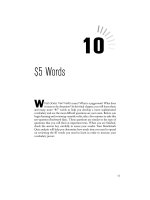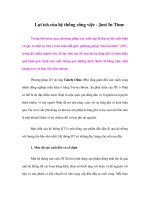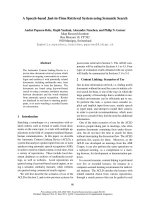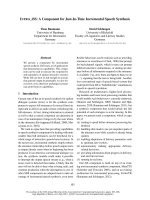Learning express Just In Time Vocabulary - $5 Words
Bạn đang xem bản rút gọn của tài liệu. Xem và tải ngay bản đầy đủ của tài liệu tại đây (173.84 KB, 32 trang )
W
hat does
hermetic
mean? What is a juggernaut? What does
it mean to be obsequious? In this final chapter, you will learn these
and many more “$5” words to help you develop a more sophisticated
vocabulary and ace the most difficult questions on your exam. Before you
begin learning and reviewing versatile verbs, take a few minutes to take this
ten-question Benchmark Quiz. These questions are similar to the type of
questions that you will find on important tests. When you are finished,
check the answer key carefully to assess your results. Your Benchmark
Quiz analysis will help you determine how much time you need to spend
on reviewing the $5 words you need to learn in order to increase your
vocabulary power.
$5 Words
10
175
JUST IN TIME VOCABULARY
176
BENCHMARK QUIZ
Select the answer that provides the meaning of the vocabulary word.
1. clandestine
a. recklessly endangering others
b. conducted in secrecy
c. to underestimate the value of
d. an attempted but failed revolution
e. unwilling to compromise
2. inculcate
a. to undermine
b. without fail, certain
c. to convert
d. to indoctrinate
e. an extended period of mourning
3. archaic
a. uncontrollable
b. insincere
c. ancient
d. insight
e. to worry
4. succor
a. assistance in a time of distress
b. to be addicted to sweets
c. to feel obligated to others
d. daring, bold
e. an inability to trust others
5. evanescent
a. childlike
b. to recommend highly
c. divided into equal parts
d. vanishing like vapor
e. a brief summary or explanation
6. laconic
a. overpriced
b. imperceptible
c. terse
d. to teem
e. one who rebels against authority
$5 WORDS
177
7. punctilious
a. without regard for rules or regulations
b. very precise and attentive to detail
c. to unknowingly mislead others
d. a minor mistake
e. very emotional writing
8. desultory
a. obsessed with beauty
b. to reveal by degrees
c. unconventional
d. aimless or haphazard
e. a place to store grain
9. pecuniary
a. having to do with money
b. related to a previous occurrence
c. one who demands justice
d. to absorb slowly
e. so small as to be immeasurable
10. oscillate
a. to relinquish
b. only once
c. heavily armed
d. to deny
e. to waver
BENCHMARK QUIZ SOLUTIONS
How did you do on identifying $5 words? Check your answers here, and then
analyze the results to figure out your plan of attack for mastering this topic.
◗
Answers
1. b. Clandestine means conducted in secrecy; kept or done in private,
often in order to conceal an illicit or improper purpose.
2. d. To inculcate means to teach and impress by frequent instruction or
repetition; to indoctrinate, instill.
JUST IN TIME VOCABULARY
178
3. c. Archaic means belonging to former or ancient times; characteris-
tic of the past.
4. a. Succor means (1) n. assistance or relief in time of difficulty or dis-
tress; (2) v. to provide assistance or relief in time of difficulty or
distress.
5. d. Evanescent means vanishing or tending to vanish like vapor; tran-
sitory, fleeting.
6. c. Laconic means brief and to the point; succinct, terse, concise.
7. b. Punctilious means extremely attentive to detail; very meticulous
and precise.
8. d. Desultory means aimless, haphazard; moving from one subject to
another without logical connection.
9. a. Pecuniary means of, relating to, or involving money.
10. e. To oscillate means (1) to swing back and forth or side to side in a
steady, uninterrupted rhythm; (2) to waver, as between two con-
flicting options or opinions; vacillate.
BENCHMARK QUIZ RESULTS
If you answered 8–10 questions correctly, well done! You are already famil-
iar with many of these advanced vocabulary words. Give the lesson a quick
review and do the practice exercise. If your score on the practice test is
equally high, congratulations—you have completed the last chapter and
have added over 350 words to your vocabulary!
If you answered 4–7 questions correctly, you already know some of these
advanced vocabulary words, but you need more of these commonly tested
$5 words in your permanent vocabulary. Be sure to set aside some time to
carefully review the vocabulary words listed in this chapter.
If you answered 1–3 questions correctly, you may have a strong basic vocab-
ulary, but you need to add some more advanced vocabulary words to your word
base. Study the lesson that follows carefully, and do the practice quiz on a sep-
arate sheet of paper so that you can do the exercise several times if necessary.
$5 WORDS
179
JUST IN TIME LESSON—$5 WORDS
Abstemious, desultory, lugubrious . . . Some words just seem like they were
made for vocabulary exams! The “$5 words” in this chapter represent the
kind of advanced vocabulary terms that often appear on more difficult
vocabulary tests. They are words that most people are not very familiar
with. For example, even if you are one of the most meticulous people you
know, you may never have been called punctilious, and you may never have
heard something from the distant past characterized as archaic. But that
doesn’t mean these words are not important or useful or even that they are
not quite common in some circles. Though they may appear less often in
our every day communications than the words in previous chapters, they do
appear regularly in more sophisticated texts, such as college-level textbooks
and professional essays, and yes, they do often appear on vocabulary exams
as a way to measure the full extent of your vocabulary.
Adding $5 words like these to your vocabulary offers numerous benefits.
First, you will understand more of what you read and hear. Second, you will
be able to express yourself more effectively. Third, during interviews and
other important occasions, you will often impress others with your sophis-
ticated vocabulary. And fourth, knowing a lot of $5 words can help you take
your exam score to a new level.
As with the words you learned in previous lessons, these advanced vocab-
ulary words will help you pinpoint meaning and express the precise con-
notation you wish to convey. For example, punctilious is a synonym of
meticulous (Chapter 7), but it expresses an even stronger, almost obsessive
attention to detail:
meticulous: extremely careful and precise; paying great attention to
detail
punctilious: extremely attentive to detail, very meticulous and precise
A punctilious person, then, is not just meticulous, but very meticulous. By
knowing this distinction, you can choose the word that expresses the appro-
priate degree.
Indeed, notice how many of these vocabulary words build on your exist-
ing word base. Several of them have words from previous chapters in their
definitions or are synonymous with words from other lessons. Ascetic, for
example, means austere, a word from Chapter 7; laconic means terse (Chap-
ter 2) or succinct (Chapter 7). Oscillate is a synonym of vacillate (Chapter 8),
and vituperate means to censure (Chapter 6) severely or rebuke (Chapter 8)
harshly. An obsequious person is excessively servile (Chapter 7) while clandes-
tine is a synonym of surreptitious (Chapter 7).
JUST IN TIME VOCABULARY
180
RULE BOOK: ALL SYNONYMS
ARE NOT CREATED EQUAL
Although some synonyms are interchangeable, it is important to remem-
ber that most words have their own unique connotation. So while exam
questions will often ask you to identify synonyms such as laconic, terse, and
succinct, when it comes to your own communications, you should choose
your words carefully. Terse, for example, has the most positive connotation
of these three words, suggesting brevity with a sense of polish or elegance.
Succinct is more neutral, conveying a sense of compactness or tightness
in how an idea has been expressed. Laconic, on the other hand, conveys
the same basic idea but with the suggestion of brusqueness or abruptness.
Thus, although these words are effectively synonymous, each word carries
its own specific connotation and leaves a slightly different impression.
Other words in this lesson have meanings that are unlike any other word
in this book and are often used in specific contexts. An epiphany, for exam-
ple, is a sudden, intuitive realization of the essence or meaning of some-
thing, a perceptive revelation; a manifestation of the divine. To gerrymander,
meanwhile, means to divide an area into voting districts so as to give one
party an unfair advantage.
The 35 upper-level vocabulary words in this chapter will help you
develop a more sophisticated vocabulary and feel more confident when you
see $5 words on your exam. There are nouns, verbs, and adjectives—many
of which use common suffix endings for their part of speech. Once more,
each definition in the list below includes a sample sentence to show how the
word is used in context. Learn these words well to boost your test score, to
understand more of what you read and hear, and to more accurately express
yourself in your day-to-day communications.
WORD LIST
abstemious (
ab
·
stee
·
mi
·
u˘s
) adj. 1. using or consuming sparingly; used with
temperance or moderation 2. eating and drinking in moderation; spar-
ing in the indulgence of appetites or passions. After Vadeem gained 30
pounds, he decided he needed a more abstemious diet.
acumen (
a˘
·
kyoo
·
me˘n
) n. quickness, keenness, and accuracy of perception,
judgment, or insight. With Jonelle’s acumen, she would make an excellent
trial lawyer.
archaic (
ahr
·
kay
·
ik
) adj. belonging to former or ancient times; character-
istic of the past. The archaic language of Chaucer’s tales makes them difficult
for many students to understand.
E
$5 WORDS
181
ascetic (
a˘
·
set
·
ik
) adj. practicing self·denial, not allowing oneself pleasures
or luxuries; austere. Eli was attracted to the peaceful, spiritual life of the
monks, but he knew he could not handle such an ascetic lifestyle.
bowdlerize (
bohd
·
le˘
·
r¯z
) v. to edit by omitting or modifying parts that may
be considered offensive; censor. To make their collection of fairy tales suit-
able for children, the Brothers Grimm had to bowdlerize the folk tales they had
collected, for many of the original tales included graphic language.
chimera (
ki
·
meer
·
a˘
) n. 1. (in Greek mythology) a fire-breathing she-monster
with a lion’s head, a goat’s body, and a serpent’s tail 2. a vain or incongru-
ous fancy; a (monstrous) product of the imagination, illusion. Seduced by the
chimera of immortality, Victor Frankenstein created a monster that ended up
destroying him and everyone he loved.
clandestine (
klan
·
des
·
tin
) adj. conducted in secrecy; kept or done in pri-
vate, often in order to conceal an illicit or improper purpose. The private
investigator followed Raul to a clandestine rendezvous with a woman in sun-
glasses and a trench coat.
coeval (
koh
·
ee
·
va˘l
) adj. of the same time period, contemporary. The poet
Ben Johnson was a coeval of Shakespeare.
desultory (
des
·
u˘l
·
tohr
·
ee
) adj. aimless, haphazard; moving from one sub-
ject to another without logical connection. Ichabod’s desultory ramblings
worsened as his disease progressed.
epiphany (
i
·
pif
·
a˘
·
nee
) n. 1. a sudden, intuitive realization of the essence or
meaning of something, a perceptive revelation 2. a manifestation of the
divine As I listened to Professor Lane’s lecture, I had a sudden epiphany that I
was in the wrong major.
evanescent (
ev
·
a˘
·
nes
·
e˘nt
) adj. vanishing or tending to vanish like vapor;
transitory, fleeting. The subject of the poem is the evanescent nature of
young love.
SHORTCUT: MNEMONICS ONCE MORE
Combine your other study strategies such as flashcards with mnemonic
devices that will help you remember meaning. For example, you can
remember the meaning of gerrymander with a sentence such as Gerry
was unfairly elected through gerrymandering. Or, you can remember her-
metic by associating it with a hermit, who is likely to have limited outside
influences.
fallacy (
fal
·
a˘
·
see
) n. a false notion or misconception resulting from incorrect
or illogical reasoning 2. that which is deceptive or has a false appearance;
something that misleads, deception. The “slippery slope’’ fallacy argues that
once X happens, Y and Z will automatically follow.
"
JUST IN TIME VOCABULARY
182
gerrymander (
jer
·
i
·
man
·
de˘r
) v. to divide an area into voting districts so as to
give one party an unfair advantage n. the act of gerrymandering. The elec-
tion was rigged by gerrymandering that gave unfair advantage to the incumbent.
hegemony (
hi
·
jem
·
o˘
·
nee
) n. predominant influence or leadership, espe-
cially of one government over others. The hegemony of his country borders
on imperialism.
hermetic (
hur
·
met
·
ik
) adj. 1. having an airtight closure 2. protected from
outside influences. In the hermetic world of the remote mountain convent, the
nuns did not even know that their country was on the brink of war.
impugn (
im
·
pyoon
) v. to attack as false or questionable; to contradict or call
into question. The editorial impugned the senator’s reelection platform and set
the tone for the upcoming debate.
inculcate (
in
·
kul
·
kayt
) v. to teach and impress by frequent instruction or
repetition; to indoctrinate, instill. My parents worked hard to inculcate in me
a deep sense of responsibility to others.
jejune (
ji
·
joon
) adj. lacking substance, meager; hence: (a) lacking in inter-
est or significance; insipid or dull, (b) lacking in maturity, childish, (c)
lacking nutritional value. The movie’s trite and overly
-
contrived plot make it
a jejune sequel to what was a powerful and novel film.
CHEAT SHEET: WATCH FOR SHAPE-SHIFTERS
By mastering the 350+ words in this book, you are really expanding your vocabulary
by closer to 500 words. That’s because hundreds more words can be formed by
adding or changing prefixes and/or suffixes on the words in these chapters. The
adjective evanescent, for example, can become the noun evanescence:
evanescent: vanishing or tending to vanish like vapor; transitory, fleeting
evanescence: the state of being evanescent
Likewise, the noun hegemony can become the adjective hegemonic:
hegemony: predominant influence or leadership, especially of one government
over others
hegemonic: leading or ruling; controlling, predominant
On your exam, you may see the words in the same form that you have memorized
from this book. But, do be on the lookout for alternate forms, and use your knowledge
of prefixes and suffixes to determine meaning.
juggernaut (
ju
·
e˘r
·
nawt
) n. a massive, overwhelmingly powerful and
unstoppable force that seems to crush everything in its path. A shroud of
fear covered Eastern Europe as the juggernaut of Communism spread from
nation to nation.
$5 WORDS
183
laconic (
la˘
·
kon
·
ik
) adj. brief and to the point; succinct, terse, concise, often
to the point of being curt or brusque. Zse’s laconic reply made it clear that
he did not want to discuss the matter any further.
lugubrious (
luu
·
oo
·
bri
·
u˘s
) adj. excessively dismal or mournful, often exag-
geratedly or ridiculously so. Irina’s lugubrious tears made me believe that her
sadness was just a façade.
machination (
mak
·
˘
·
nay
·
sho˘n
) n. 1. the act of plotting or devising 2. a
crafty or cunning scheme devised to achieve a sinister end. Macbeth’s
machinations failed to bring him the glory he coveted and brought him only
tragedy instead.
SHORT CUT: HAPPY COUPLES
As you have already seen, many of these $5 words have synonyms else-
where in this book. Pair up the words in this chapter with other vocabu-
lary words to help you remember meaning. They can be synonym or
antonym pairs (e.g., bowdlerize and censor) or just useful associations,
such as inculcate and proselytize.
myriad (
mir
·
i
·
a˘d
) adj. too numerous to be counted; innumerable; n. an
indefinitely large number; an immense number, vast amount. To the
refugees from Somalia, the myriad choices in the American supermarket were
overwhelming.
obsequious (
o˘b
·
see
·
kwi
·
u˘s
) adj. excessively or ingratiatingly compliant or
submissive; attentive in a servile or ingratiating manner, fawning. The
obsequious manner of the butler made it clear that he resented his position.
oscillate (
os
·
˘
·
layt
) v. 1. to swing back and forth or side to side in a steady,
uninterrupted rhythm 2. to waver, as between two conflicting options or
opinions; vacillate. The rhythm of the oscillating fan put the baby to sleep.
pecuniary (
pi
·
kyoo
·
ni
·
er
·
ee
) adj. of, relating to, or involving money. Rosen
was relieved to learn that his penalty would be pecuniary only and that he would
not have to spend any time in jail.
proselytize (
pros
·
e˘
·
li
·
t¯z
) v. to convert or seek to convert someone to
another religion, belief, doctrine or cause. After a few minutes, it became
clear to Hannah that the purpose of the meeting was really to proselytize as
many attendees as possible.
propinquity (
proh
·
pin
·
kwi
·
tee
) n. 1. proximity, nearness 2. affinity, simi-
larity in nature. The propinquity of these two elements make them difficult to
tell apart.
punctilious (
punk
·
til
·
i
·
u˘s
) adj. extremely attentive to detail, very meticu-
lous and precise. One of the reasons he excels as an editor is because he is so
punctilious.
"
JUST IN TIME VOCABULARY
184
seditious (
si
·
dish
·
u˘s
) adj. arousing to insurrection or rebellion; engaging in
or promoting sedition (conduct or language which incites resistance or
opposition to lawful authority). Toby’s seditious behavior nearly started a riot
at the town meeting.
CHEAT SHEET: BEGINNINGS, MIDDLES,
AND ENDS
As you review these words, don’t forget about word parts. Use prefixes, suffixes, and
word roots to help you better understand and remember the words in this lesson.
succor (
suk
·
o˘r
) n. assistance or relief in time of difficulty or distress; v. to pro-
vide assistance or relief in time of difficulty or distress. The Red Cross and
other relief organizations provide succor to the needy during natural disasters.
surfeit (
sur
·
fit
) v. to feed or fill to excess, satiety, or disgust; overindulge;
n. 1. an excessive amount or overabundance; glut 2. the state of being or
eating until excessively full. In many third
-
world countries, the leaders and
a select few enjoy a surfeit of wealth while most of the population lives in squalor.
sycophant (
sik
·
o˘
·
fa˘nt
) n. a person who tries to win the favor of influential
or powerful people through flattery; a fawning parasite. Omar realized
that one of the drawbacks of his celebrity was that he would always be surrounded
by sycophants.
unctuous (
unk
·
choo
·
u˘s
) adj. 1. unpleasantly and excessively or insincerely
earnest or ingratiating 2. containing or having the quality of oil or oint-
ment; greasy, slippery, suave. I left without test driving the car because the
salesperson was so unctuous that I couldn’t trust him.
vituperate (
v¯
·
too
·
pe˘
·
rayt
) v. to criticize or rebuke harshly or abusively; to
censure severely, berate. After being vituperated by her boss for something
that wasn’t even her fault, Jin handed in her letter of resignation.
TIPS AND STRATEGIES
Though $5 words may seem intimidating, you can tackle them with the
same strategies you have been using all throughout this book. Here are
some specific tips and strategies to use as you countdown to your exam.
• Remember all of the vocabulary tools you already have at your dis-
posal. Use context (if available), prefixes and suffixes, and word
roots to help you determine meaning; use the process of elimina-
tion to help narrow down your answer choices.
• Read each definition and sample sentence carefully to fully under-
stand each word and its connotation.
$5 WORDS
185
• Remember the power of mnemonic devices to help you memorize
new words. Create memorable rhymes, images, or sentences that
will help you recall meaning.
• Make your study time doubly productive by matching the words in
this lesson with words from other chapters. You can group together
words with the same or opposite meanings or words that share a
particular association.
• Pay attention to connotation and degree. Machination, for example, is
not just a scheme; it’s a crafty scheme, one that suggests an evil purpose.
• Review, review, review. In whatever time you have left before your
exam, review the words in this book as much as you can. The more
you review them, the more quickly they will become part of your
permanent vocabulary and the more comfortable you will feel using
them in your conversations and writing. Make note of the chapters
with which you had the most difficulty and set aside extra time for
those words. Come back to these chapters after your exam, too. You
will not only have improved your vocabulary just in time—you will
have a rich vocabulary for all time.
PRACTICE
For questions 1–20, choose the vocabulary word that matches the definition.
1. a sudden, intuitive realization of the essence or meaning of something
a. propinquity
b. epiphany
c. sycophant
d. machination
e. acumen
2. of, relating to, or involving money
a. lugubrious
b. archaic
c. coeval
d. pecuniary
e. unctuous
3. used or consumed sparingly or in moderation
a. abstemious
b. hermetic
c. ascetic
d. evanescent
e. laconic
JUST IN TIME VOCABULARY
186
4. a crafty or cunning scheme with a sinister purpose
a. juggernaut
b. fallacy
c. gerrymander
d. hegemony
e. machination
5. excessively dismal or mournful
a. obsequious
b. seditious
c. lugubrious
d. jejune
e. clandestine
6. to seek to convert someone to another religion, belief, or cause
a. bowdlerize
b. proselytize
c. oscillate
d. inculcate
e. vituperate
7. to provide assistance or relief in time of difficulty
a. succor
b. impugn
c. gerrymander
d. surfeit
e. inculcate
8. someone who tries to win the favor of the influential or powerful
through flattery
a. chimera
b. coeval
c. hermetic
d. sycophant
e. juggernaut
9. belonging to former or ancient times
a. desultory
b. archaic
c. myriad
d. pecuniary
e. seditious









![just in time math for engineers [electronic resource]](https://media.store123doc.com/images/document/14/y/jc/medium_jcn1401357942.jpg)